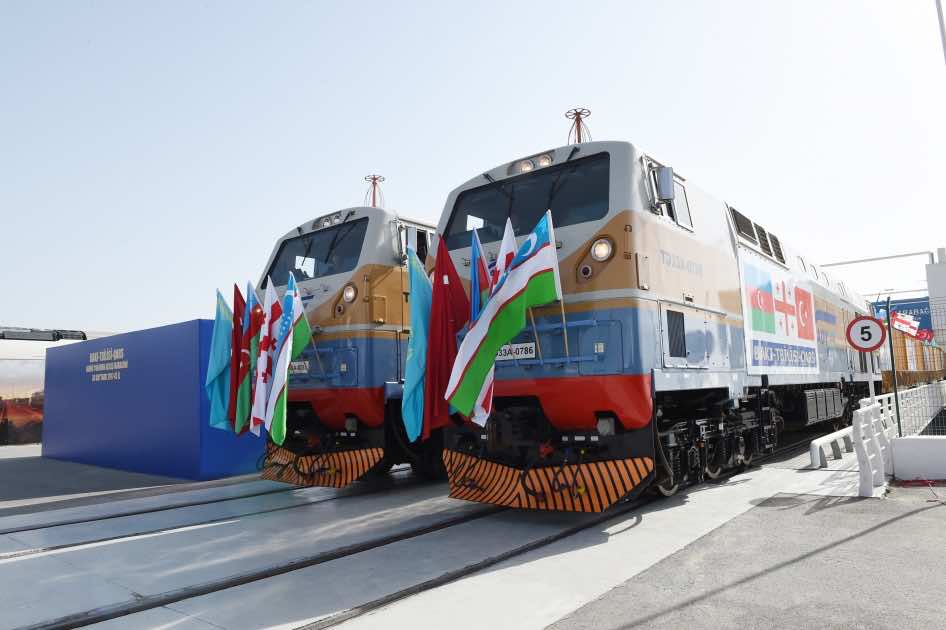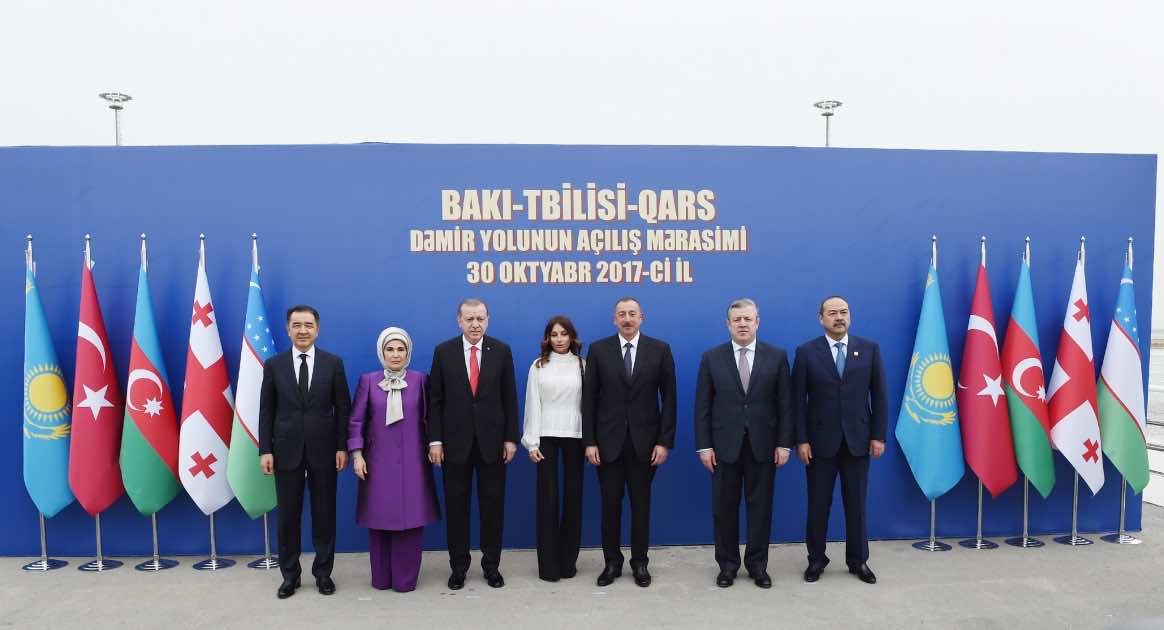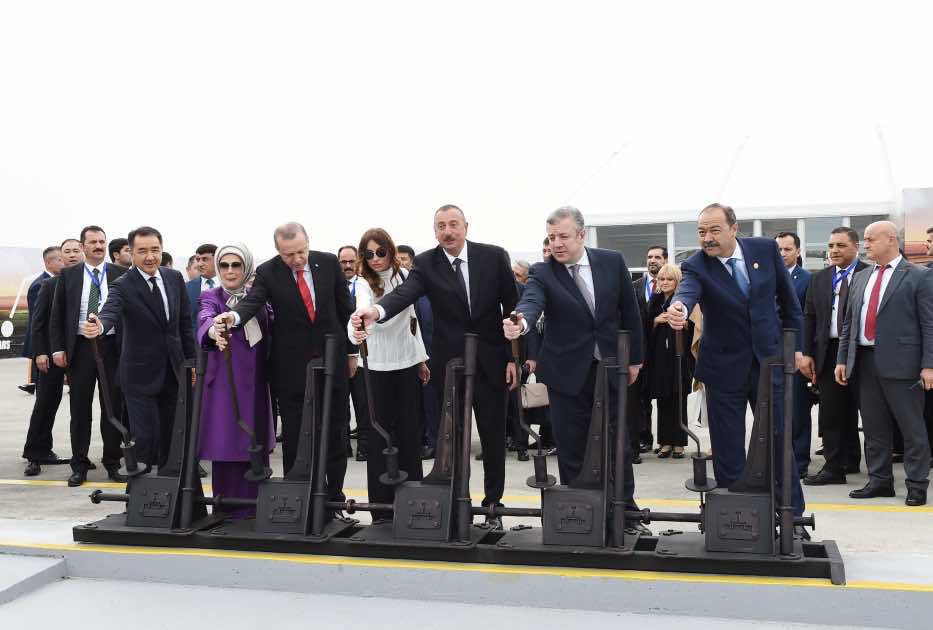Opening of the Baku-Tbilisi-Kars railway
 One of the main goals of the foreign policy of Azerbaijan regained its independence, is the turning the country into one of the international transport and communication centers. In this regard, the construction of the Baku-Tbilisi-Kars railway plays an important role.
One of the main goals of the foreign policy of Azerbaijan regained its independence, is the turning the country into one of the international transport and communication centers. In this regard, the construction of the Baku-Tbilisi-Kars railway plays an important role.
The construction of the Georgian railway line between Azerbaijan and Turkey was discussed for the first time in July 1993. The agreement on the construction of the railway was signed between Azerbaijan, Georgia and Turkey in January, 2005. At that time, the implementation of the project was postponed due to lack of funds. However, during the inauguration of the main export oil pipeline Baku-Tbilisi-Jeyhan in May, 2005, the presidents of all three countries expressed their interest in the construction of the railway line.
Azerbaijan President Ilham Aliyev, Georgian President Mikhail Saakashvili and Turkish Prime Minister Recep Tayyip Erdogan signed the agreement in February, 2007 in Tbilisi. The agreement envisages the railway project from the Georgian cities of Tbilisi and Akhalkalaki to the Turkish city of Kars or the Baku-Tbilisi-Kars railway project. The foundation stone-laying ceremony of the Georgian part of the railway was held on November 21, 2007 at Marabda station in the Tetri-Tskaro region of Georgia. Azerbaijan President Ilham Aliyev, Turkish President Abdullah Gul and Georgian President Mikhail Saakashvili, as well as officials from the European Union, USA and other countries attended the ceremony. The railway connection between Turkey and Central Asia, which was cut off in 1993 as a result of Armenia’s military aggression against Azerbaijan, would be re-established with the launch of the Baku-Tbilisi-Kars railway, enabling a direct connection from Europe to China and calling the “Iron Silk Road”. The construction of the 105-kilometer railway from Kars to Akhalkalaki required an investment of 420 million dollars. Turkey was supposed to finance the 76-kilometer section from Kars to the Georgian border and invest 220 million dollars.
Armenia, the Armenian lobby, Armenians in foreign countries and centers under their influence opposed the construction of this road. Even there were opponents from the United States and the European Union. They demanded the opening of the Kars-Gyumri-Tbilisi railway line instead of building the Baku-Tbilisi-Kars railway. However, due to the Nagorno-Karabakh conflict, those demands were rejected, and Azerbaijan embarked the financing of the construction of the railway line. The state of Azerbaijan didn’t allow the passing of the railway through the territory of the aggressor Armenia. With the laying of the foundation of this road in the territory of Georgia, Armenia was left out of that huge project.
Georgia was supposed to build a 30-kilometer line from the Turkish border to Akhalkalaki with a 25-year 220 million dollar loan from Azerbaijan at a rate of 1% per year. Georgia also had to rebuild the existing 160-kilometer line to the Azerbaijan’s border. According to preliminary estimates, 1,5 million passengers and 3 million tons of cargo should be transported in 2010. In 2034, it was predicted that 3.5 million passengers and 16.5 million tons of cargo would be transported annually. A membership protocol was signed for Kazakhstan to join this road.
 Azerbaijan, Georgia and Turkey were the initiators, financiers, and implementers of the projects promoted great cooperation in the region. The common will of the three counties had a positive effect on the development of the region. These projects directed against any state, confirmed that Azerbaijan, Georgia and Turkey are very big regional powers. Azerbaijan overcame obstacles together with partner countries.
Azerbaijan, Georgia and Turkey were the initiators, financiers, and implementers of the projects promoted great cooperation in the region. The common will of the three counties had a positive effect on the development of the region. These projects directed against any state, confirmed that Azerbaijan, Georgia and Turkey are very big regional powers. Azerbaijan overcame obstacles together with partner countries.
On July 24, 2008, the foundation of the Turkish section of the Baku-Tbilisi-Kars railway was laid in Kars, Turkey. The speakers emphasized the importance of the road at the ceremony attended by Turkish President Abdullah Gul, Azerbaijan President Ilham Aliyev and Georgian President Mikheil Saakashvili.
“Azerinshaatservis” company of Azerbaijan realized the construction of the Georgian part of the railway line and the construction of the 76 km section in Turkey was carried out by the Turkish company Ozgun Yapi-Celikler. The railway construction envisaged 68 km in Turkey and 30 km in Georgia. However, the Russian-Georgian war in August, 2008 and the global financial crisis slowed down the construction works.
The state of Azerbaijan approved all processes and decisions. The railway was commissioned on October 30, 2017. Products from Asia are delivered to Europe in 15 days as a result of the implementation of the Baku-Tbilisi-Kars project, part of TRASEKA and the Great Silk Road linking Turkey and Azerbaijan, thus Central Asia and China with Europe. The railway has of great political, economic and strategic importance for Azerbaijan. Through it, Azerbaijan gets access to international transport corridors and to Turkey. Baku-Tbilisi-Kars railway after the main export oil pipeline Baku-Tbilisi-Jeyhan, is further developing the economy of Azerbaijan receiving income from transit and improving infrastructure in the country. The railway turns the Republic of Azerbaijan into an important geopolitical and geoeconomic center connecting the world’s economic powerhouse - the European Union, China and the countries of Southeast Europe. The construction of this project on the historical Silk Road increases its attractiveness for the countries of the region. At the same time, it facilitates the access of Central Asian countries - Turkmenistan, Kazakhstan, Uzbekistan, Kyrgyzstan and Tajikistan, as well as Afghanistan to European and world markets and plays important role in the development and integration of their trade relations and economy.
By the order of Azerbaijan Railways Closed Joint Stock Company, passenger cars produced by the Swiss Stadler Rail Group were delivered to Baku. Passenger transportation on the Baku-Tbilisi-Kars route will be realized soon.
In the framework of the Baku-Tbilisi-Kars project, a separate railway line from Kars to Nakhchivan is planned to construct in the future. This will lead to the removal of the autonomous republic from the blockade of Armenia and ensuring its transport independence.
Recommended literature:
- Qasımlı, Musa Cəfər oğlu. Azərbaycan Respublikasının tarixi: 1991-2021: 2 cilddə / M. C. Qasımlı ; elmi red. İ. X. Zeynalov ; Bakı Dövlət Universiteti. - ISBN 978-9952-546-20-0. II cild : 2003-2021. - Bakı : BDU nəşriyyatı, 2021. - 520 s.
- Əsədov, Aqil Mahiyəddin oğlu. Azərbaycan Respublikasında yeni nəqliyyat sisteminin formalaşması və davamlı inkişafı : elmi-nəzəri əsasları və perspektivləri: monoqrafiya / A. M. Əsədov ; elmi red. İ. H. Aliyev ; AMEA İqtisadiyyat İnstitutu. - Bakı : Avropa nəşriyyatı, 2014. - 338 s.
- Həmidov, Habil Ağanemət oğlu. Azərbaycan və İpək Yolu. Tarix və müasirlik: monoqrafiya /H. Həmidov ; elmi red. R. Mirzəzadə ; AMEA, Fəlsəfə, Sosiologiya və Hüquq İn-tu. - Bakı: Təknur, 2009. - 158 s.
- Böyük İpək yolu Azərbaycan dövlətinin geostrateji maraqları kontekstində /[E. Mirbəşir oğlu (tərtibçi) [və b.]] ; elmi red. L. Əhmədova ; red. S. Sadıxqızı ; AMEA, Hüquq və İnsan Haqları İn-tu. - Bakı: Elm və təhsil, 2016. - 151 s.
- Hamidov, Habil. Heydar Aliyev and the foreign policy of Azerbaijan [Text] : in the context of silk way and energy security /H. Hamidov ; editor S. Hasano ; reviwers A. Bashirov, S. Bagirov, Z. Aliyev, D. Hashimov ; [design V. Mammadova]. - Baku: Teknur, 2013. - 91, p.
- Klimas, Evaldas. Baku-Tbilisi-Kars railroad : the iron ground for the silk road: future opportunities & prospects /E. Klimas, M. Humbatov ; Mykolas Romeris University. - Vilnius: Mykolas Romeris University, 2016. - 143 p.
- Azerbaijan on the Silk Road / International Turkic Culture and Heritage Foundation; original idea, foreword G. Afandiyeva ; project manager, ed. S. Mustafayev ; ed. I. Peart ; trans. A. Afandiyev. - Baku : Tahsil, 2020. - 344 p.
- Əliyev İlham. Bakı – Tbilisi – Qars dəmiryolunun Gürcüstan hissəsinin təməlqoyma mərasimində Azərbaycan Prezidenti İlham Əliyevin nitqi // İnkişaf – məqsədimizdir. 27-ci kitab, səh. 266- 267.
- Azərbaycan Respublikasının tarixi (2003-2016). 2-ci cild. Bakı: Azərbaycan Tarixçiləri İctimai birliyi, 2016, 716 səh.
- Müstəqillik yollarında. Məqalələr toplusu. Bakı: Şərq-Qərb, 2016, 628 səh.